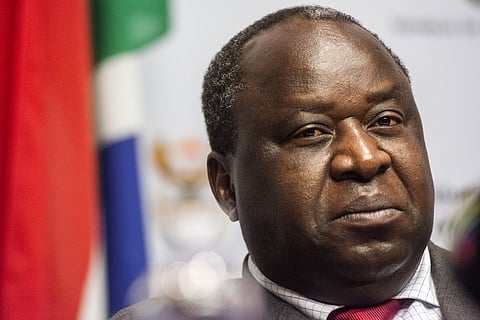Will Mboweni shut down SAA? It’s starting to look that way!
EDINBURGH — The Free Market Foundation has put together a media release in which it suggests that Tito Mboweni could succeed in having troubled national airline SAA shut down. South African Airways has been in the headlines for the better part of the past decade in connection with gross mismanagement and corruption. Former SAA chair Dudu Myeni clung to her captain's chair amid an outcry over her close links with former president Jacob Zuma and her inability to fly SAA into the black. The FMF underscores that SAA has cost South African taxpayers about R57bn in handouts but has continued to record ever greater losses. Until now, ANC leaders have supported throwing money into an airline that has benefited the rich at the expense of the poor. Tito Mboweni, the new finance minister who was brought back to the frontline of government after president Cyril Ramaphosa started cleaning up on corruption, has been making noises that it is time to pull the plug on SAA. There are better ways to spend money, for example on improving train services for the masses. The FMF sums up the financial picture. – Jackie Cameron
From the Free Market Foundation
Not only is new finance minister Tito Mboweni the first ANC politician to propose that SAA should be closed down, he is also the first to repeat the Free Market Foundation's (FMF) rallying cry that subsidising SAA harms the poorest in society. FMF executive director Leon Louw is frequently on record as saying, "Bailouts to SAA are subsidising the rich who fly at the expense of the poor who don't". In a portfolio committee briefing of Parliament's standing and select committees on finance and appropriations on 25 October, Mboweni said that SAA was not used by South Africa's working class majority and asked members of Parliament (MPs) to consider whether it would be wiser to direct state funding to ensuring that trains and other forms of proletarian transport ran better.
In his maiden Medium Term Budget Policy Statement on 24 October, Mboweni announced that SAA would receive a further R5 billion bailout of tax-payer funds and that SA Express would receive R1.7 billion but there was no mention of the ill-considered plan to merge two failing airlines.
However, again a first, the R5 billion will be made via an Appropriation Bill which means that Parliament must debate and decide on whether SAA should receive the funds rather than, as with previous bailouts, the decision resting with the Treasury and Finance Minister with no public scrutiny. This means there is ample opportunity for the spotlight to shine on the many billions that have been poured into SAA, with what result and at what opportunity cost.
It is a brilliant move by a finance minister. He has put the decision where it should be – open to public scrutiny and comment in Parliament.
In 2015, private airline Comair, owner of low cost airline Kulula, SA franchise operator of British Airways and profitable for 75 years, went to court over the same sum, a R5 billion bailout, arguing that it should be subject to Parliamentary oversight through an Appropriation Bill rather than via a Treasury handout. Comair lost the case but won in the court of public opinion when the full extent of SAA public funding, and the cost to the poor in diverted public spending, was laid bare. It may have taken a further three years, but obviously the lesson was not lost on Mboweni. Let Parliament decide.
In total, SAA has received government financial assistance of a staggering R57,757 billion. In the last financial year, SAA made a loss of R5.7 billion and is on course for larger losses in 2018/9. SAA has yet to release audited financial statements (AFS) due to disputes with the Auditor General.
Perhaps Mboweni has seen the writing on the wall. Recently SAA staved off calls and court action for business rescue by trade union Solidarity with promises of an immediate attempt to find an equity business partners. Since then, SAA has been remarkably silent on this matter. Mboweni offered an explanation in the committee hearing, when he said it would be hard to find a private equity partner for South African Airways (SAA) and made a case for selling the national carrier. "I doubt you are going to find a candidate to come in", and that any potential investor would immediately be taking on almost R22 bn of debt. "Nobody has that kind of money," he said. He also cited the case of Swiss Air as a precedent to closing a loss making, public funds guzzling national airline.
That the new Finance minister can make such bold moves, serves to highlight the need for more influential politicians not dependent on party and presidential patronage.
Note to the editor – below table illustrates total financial assistance to SAA

